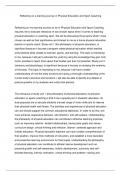Reflecting on a learning journey in Physical Education and Sport Coaching
Reflecting on my learning journey so far in Physical Education and Sport Coaching,
requires me to evaluate relevance of two chosen topics when it comes to teaching
physical education or coaching sport. We will be discussing three topics which I have
chosen as well as their significance and interest to me as a future physical education
teacher or sports coach. Study unit 1 (the philosophy of physical education), is
significant because it focuses a program called physical education which teaches
and practices skills related to exercise, sports, and dancing. This topic is interesting
to me, because I will get to educate the youth by using the knowledge they gain from
motor activities to teach them about their bodies and their full potential. Study unit 3
(anatomy and physiology), is significant because it focuses on studying the anatomy
of the body. This topic is interesting to me, because I will have a better
understanding of how the body functions by having a thorough understanding of the
human body's structure and functions. I will also be able to identify any defects in
posture growths of my students and notify their parents.
The relevance of study unit 1 (the philosophy of physical education) to physical
education or sports coaching is that it has a special part in students' education. Its
dual purposes are to educate students a broad range of motor skills and to improve
their physical health and fitness. The activities and experiences of physical education
can and should support the common educational objectives. In order to do this, one
must enhance cooperative behavior, self-direction, and self-esteem. Understanding
the philosophy of physical education can contribute to effective teaching practices
such as improving teacher- student relationships, having clear goals and values,
curriculum design, critical thinking and refection, learner- centered approach and
holistic education. Physical education teachers can have a better comprehension of
their position, improve their methods of instruction, and establish a more favorable
and productive learning environment for their pupils. Understanding the philosophy
of physical education can contribute to athlete/ learner development such as
personal growth and self-awareness, holistic development, autonomy and self-
directed learning, intrinsic motivation, critical thinking and problem- solving and
, resilience and adaptability. A more insightful and satisfying experience can result
from athletes' and learners' increased self-awareness, understanding of their beliefs,
and position in the athletic environment. Understanding the philosophy of physical
education can contribute to creation of safe and inclusive learning environments
such as inclusive pedagogies, emphasis on social justice, safe spaces for
vulnerability, emphasis on consent and autonomy, fostering positive relationships
and focus on ability, not disability. The relevance of study unit 2 (anatomy and
physiology) to physical education or sports coaching is that it offers a basis for
comprehending physical activity, exercise, and human mobility. Understanding
anatomy and physiology can contribute to effective teaching practices such as
movement analysis, exercise design, injury prevention, lesson planning, progressive
overload and adaptations for special needs. Understanding anatomy and physiology
can contribute to athlete/ learner development such as movement efficiency,
optimized training, strength and conditioning, mental preparation and focus,
enhanced body awareness and injury prevention and management. Understanding
anatomy and physiology can contribute to creation of safe and inclusive learning
environments such as safe movement practices, body positivity and inclusivity,
modifying activities for diverse needs, injury risk management, adapting for age and
development and creating a safe place for vulnerability.
Practical strategies for integrating the philosophy of physical education into my
professional practice as a physical education teacher or sports coach are to align
lesson plans with philosophical values, reflect on your values and beliefs, develop a
teaching or coaching philosophy statement, foster critical thinking and reflection,
emphasize holistic development, create inclusive learning environments, promoting
lifelong learning and physical literacy, use narrative and storytelling, engage in
ongoing professional development, collaborate with colleagues and experts, conduct
action research or self- study and develop a growth mindset. We can incorporate the
philosophy of physical education in lesson plans by aligning objectives with
philosophical values: ensure lesson goals reflect philosophical principles like
physical literacy, inclusivity, and holistic development. Incorporating critical thinking
and reflection: encourage students to think critically about physical education and its
relevance to life. Using narrative and storytelling: share personal anecdotes or case




